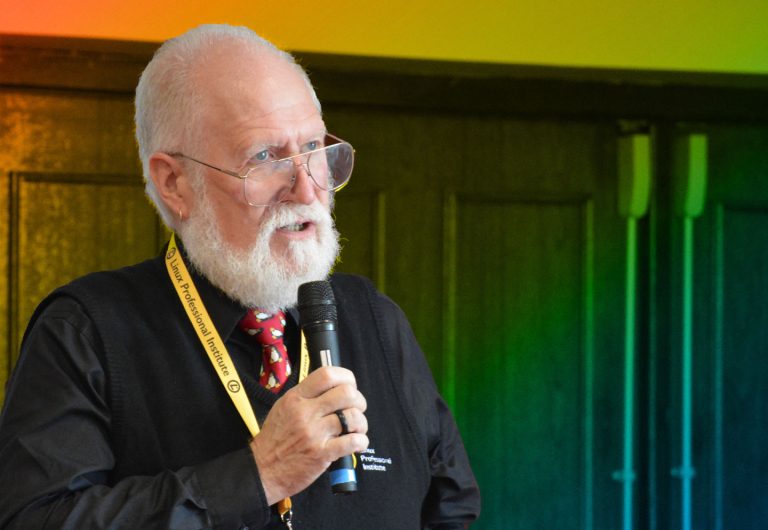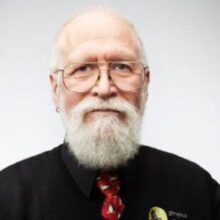My LGBTQ+ life in tech

Recently I was honored to be included in a list of « 27 LGBTQ+ Scientists and Tech Leaders Shaping Our Future » in an article of “Interesting Engineering ».
I asked Björn Schönewald, LPI’s Marketing Manager, to post this article on the LPI web site and he suggested that I write an article about my life as an LGBTQ+ tech person, since the tech community (and particularly computer tech) has been very friendly to LGBTQ+ people throughout the time I have been in it. As so many have said and heard, just « show me the code »….which is actually the way that LGBTQ+ people WANT to be treated, as equals. And so I wrote this blog post:
First of all, I consider my sexuality to be a very small, but very important part of my life. It is important, because it shapes my choice of who I want to share my life. It is small, because it never affected where I lived, or what job I wanted.
From the outside I look like your normal, bearded male. You can not tell from the way I code whether I am « gay » or « straight ». One of my favorite cartoons says “On the Internet no one can tell you are a dog.”
I have male friends and I have female friends. Contrary to what a lot of « straight » people think, I am not sexually attracted to every man, the same way that « straight » men are not sexually attracted to every woman.
On the other hand I can appreciate feminine beauty, and I can appreciate a handsome man (which I believe most people can do). I love hanging out with both (and all) sexes. It is the person I love, not whether they are male or female, gay or straight.
There was never any « decision to be gay ». There was a certain age that I recognized I was not heterosexual, and like many homosexuals of my era I realized that being generally « out » was not a good thing to do.
Nevertheless as I grew in my career I started to understand that the Tech community, mostly based in the San Francisco and Silicon Valley area, was known for their diversity.
Two of the companies I worked for, AT&T Bell Laboratories and Digital Equipment Corporation also seemed to tolerate « Gay and Lesbian » people.
While at Bell Laboratories I started to become familiar with user Groups such as the Digital Equipment Corporation User Group (DECUS) and the USENIX Organization (which was based in Berkeley, California).
Both of these groups were very accepting of homosexuals, bisexuals and other types of LGBTQ+ people. USENIX even had a Special Interest Group (SIG) that was made up of LGBTQ+ people and their « straight » friends. The SIG meeting was always the first night of USENIX meetings and was open to everyone. While I attended some of the meetings, I was still not ready to « come out », so I did not publicly identify as homosexual.
Time went on. Many of my close friends and some of my co-workers at DEC knew I was gay, since I told them. I saw no reason to tell the rest of them.
When Linus and Tove Torvalds offered to make me a godfather of their first born child, I told them that I was gay. I did not want them to find out later. They looked at me and said « So »? It was not even a factor for them.
A year later as Tove was expecting their second child, they asked me to be a godfather again « Just to let you know the first time was not a mistake. »
Each time I was offered to be a godfather (I have two Brazilian godsons) I made sure the parents knew. Each time there was no issue or hesitation.
In 2009 New Hampshire was trying to pass marriage equality. New Hampshire already had « Civil Unions » but these had a lot of problems, so we started to push to change the law to marriage equality.
I had been a Justice of the Peace in New Hampshire for twenty years. I perform secular weddings typically for couples that « the church » will not wed. Mixed religions, atheists, divorcees, etc. It was natural for me to fight for marriage equality.
I met with the Human Rights Campaign (HRC). I helped with phone banks, calling people to ask them to support marriage equality. I attended rallies at the State House in Concord, New Hampshire.
And while starting to fight for marriage equality and the discussion of homosexual rights I started to hear about kids being kicked out of their homes, and committing suicide because they were “gay”.
I started to get angry. I did not care about my « rights »…I was doing fine. I did care about these kids.
But I was still not fully « out ». My parents were fundamentalist Christians and in the twilight of their years. I did not want them to find out that their « baby boy » was not going to go to « Heaven », so I kept my sexuality an « Open Secret ».
This changed in July of 2011 when my father died. My mother had died the previous May. I had no reason to remain “in the closet”. I do not know (and will never know) if they knew I was gay. We never talked about it but there is a big difference between “suspecting” and being told.
In June of 2012 I wrote a blog article in Linux Pro Magazine on the 100th birthday of Alan Turing to talk about my homosexuality.
My main goal was to reach out to the LGBTQ+ « geeks » who tended to receive a « double whammy ». They were bullied because they were geeks AND they were bullied because they were gay. I was aware that the suicide rate of LGBTQ+ kids was four or five TIMES that of « straight » kids.
LGBTQ+ kids were more likely to be homeless on the streets.
Even as an atheist, this was a crime against god.
So I wrote the article to let the kids know « It gets better ». That you will be able to go out and get a good job and have a good life with the person that you love.
That the « bullies » will not have power over you. That you can live an honorable and useful life.
I also wrote it for parents who may find out that their son and daughter are homosexual….that they are exactly the same person they were the moment before the parents knew their kids were LGBTQ+. No different.
I published the blog and tens of thousands of people read it and shared it with other people.
There were a huge number of comments. 99% of them were supportive. I answered them all, even though some detractors thought I would not answer them.
Things did change a little for me. When I went to conferences I had young people come up to me and thank me for writing the article.
One young man came up to me at a conference, yelling at the top of his lungs « HE IS GAY, HE IS GAY! » Not knowing exactly why he was yelling this at the top of his lungs, I walked up to him, put my hand on his shoulder and said quietly « That is a very, very small part of my being….I am so much more. »
The young man looked startled, and became quiet.
I would sit at the conference tables with other LGBTQ+ people.
I started going to more Pride Parades.
I was invited to be in an edition of OUT Magazine of the 100 « gay icons » for one year.
I started to become much more tolerant of everyone. I started judging people on what they did and how they acted instead of who they were and how they looked. I started asking myself “Does what they do hurt me or other people in any way?” and almost without exception, the answer was “no”.
And at the age of 62 I started to date. I had « dated » before, but in trying to determine my sexuality the dates were with women, which ultimately failed.
Now I dated men….and it has been much more successful.
Of course these days things are a little different than they were even a decade ago. While things are still not perfect, there is a majority of people in the USA who are in favor of marriage equality.
Unfortunately there are still some really bad issues that need to be fixed.
Trans people still need more understanding and the ability to live their life the way they want.
There are nations that I would feel uncomfortable visiting. Some nations where homosexuality is illegal I will not visit. It is not that I would engage in homosexual activity while I was there (I respect other country’s laws) there are some countries where simply BEING homosexual is punishable by death. Since I am openly LGBTQ!+ and known to be homosexual, I could be arrested and put to death.
Unfortunately this means that I can not go to these countries, can not talk to them about Free and Open Source Software and can not help them improve their economy. This depresses me.
So until those countries change their laws and start treating LGBTQ+ people with the respect they deserve, I feel I have to stay with the other countries of the world.
So if you are LGBTQ+ person, and you see me at a conference, come up and talk with me. You will find that I do not bite.
